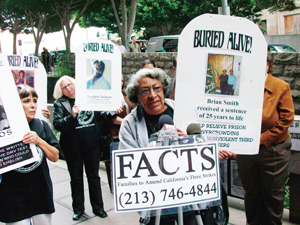By Charlene Muhammad CHARLENEM

LOS ANGELES (FinalCall.com) – Loved ones of inmates serving life sentences are gathering petition signatures for an initiative they believe will finally reform California’s draconian Three Strikes law, which means a life sentence once someone is convicted of three felony crimes.
Voters passed Three Strikes in 1994, aiming to imprison very violent felons like murderers, rapists and child molesters for life. Today, more than 4,000 people are incarcerated under Three Strikes, and more than half of them have committed non-violent, non-serious crimes, according to the Stanford Three Strikes Project.
Stanford Law School professors drafted the Three Strikes Reform Act of 2012 to amend the law and require a third strike be a violent, serious crime in order to garner a sentence of 25 years to life. Currently, anyone convicted of any felony, even minor nonviolent crimes such as shoplifting or drug possession, can be sentenced to life if they have two prior felony convictions.
“The majority of our loved ones will likely be able to come out and it will also ensure in the future that nobody will get a life sentence for a minor offense,” said Geri Silva, executive director of Families to Amend California’s Three Strikes Law. She is collecting signatures to get the initiative on the ballot later this year. She feels the change is a good step forward but warns there’s work to be done.
Supporters need 500,000 signatures by April to put the measure before voters in November. Passage would mean new convictions would receive double the ordinary sentence instead of a life sentence. It wouldn’t mean automatic release from prison, rather inmates serving life sentences for minor crimes would apply for re-sentencing under a judge’s review.
However, anyone ever convicted of an extremely violent crime, such as rape, murder, or child molestation, would receive life sentences, no matter how minor their third strike crime, explained Dan Newman of the Stanford Three Strikes Project.
Dorothy Erskine, a member of Families to Amend California’s Three Strikes Law, is thankful that the Stanford Three Strikes Project has taken the issue on. She is a little disappointed that the measure excludes unoccupied house burglary from its list of non-violent crimes.
Her nephew, Brian Smith, has been in prison since 1994, serving a life sentence for aiding and abetting shoplifting.
“He may or may not have been guilty of aiding and abetting but I just feel like the time should fit the crime,” she said.
According to the California Department of Corrections and Rehabilitation, 54 percent of Three Strikes inmates were sentenced to life for non-violent crimes and Blacks represent 45 percent of Three Strikes inmates.
Opponents of Three Strikes sought reform through Proposition 66 in 2004. It would have amended the law to apply only to violent felonies and permit re-sentencing. According to the Legislative Analyst’s Office, California’s non-partisan fiscal and policy advisor, voters overwhelmingly supported the proposition, which would have saved several hundred million dollars annually, primarily in the prison system.
A poll placed Proposition 66 ahead by 68 percent a month before November 2004 elections. In a last-ditch campaign blitz, former Gov. Arnold Schwarzenegger invoked voters’ fears through TV ads claiming 26,000 hardened criminals, like murderers and rapists, would be freed from prison, if the referendum passed.
Proposition 66 was defeated. The Three Strikes Reform Act of 2012 is another opportunity to turn things around through the political system, Ms. Erskine said warily. During the fight for Proposition 66, many state representatives felt the law was unjust but also felt it was political suicide to try to change it, she said.
Three Strikes’ opponents are prepared for the uphill battle, Ms. Erskine said.
“Even with Dr. Martin Luther King, Jr., I’m sure that people realized many, many, many years before how unjust it was because of your color, you’ve got to sit at the back of the bus but look how long it took to really materialize,” Ms. Erskine said.
According to The Field Poll, an independent, non-partisan survey by Field Research Corporation, 74 percent of likely voters support reforming the Three Strikes law in light of California’s prison overcrowding crisis.
“I think the people of California can see through what is happening and realize that the prisons are overcrowded to begin with. They’re spending $50,000 per person a year to keep people incarcerated and as they grow older, that amount escalates to sometimes at least $80,000. Something needs to be done,” Ms. Erskine said.












